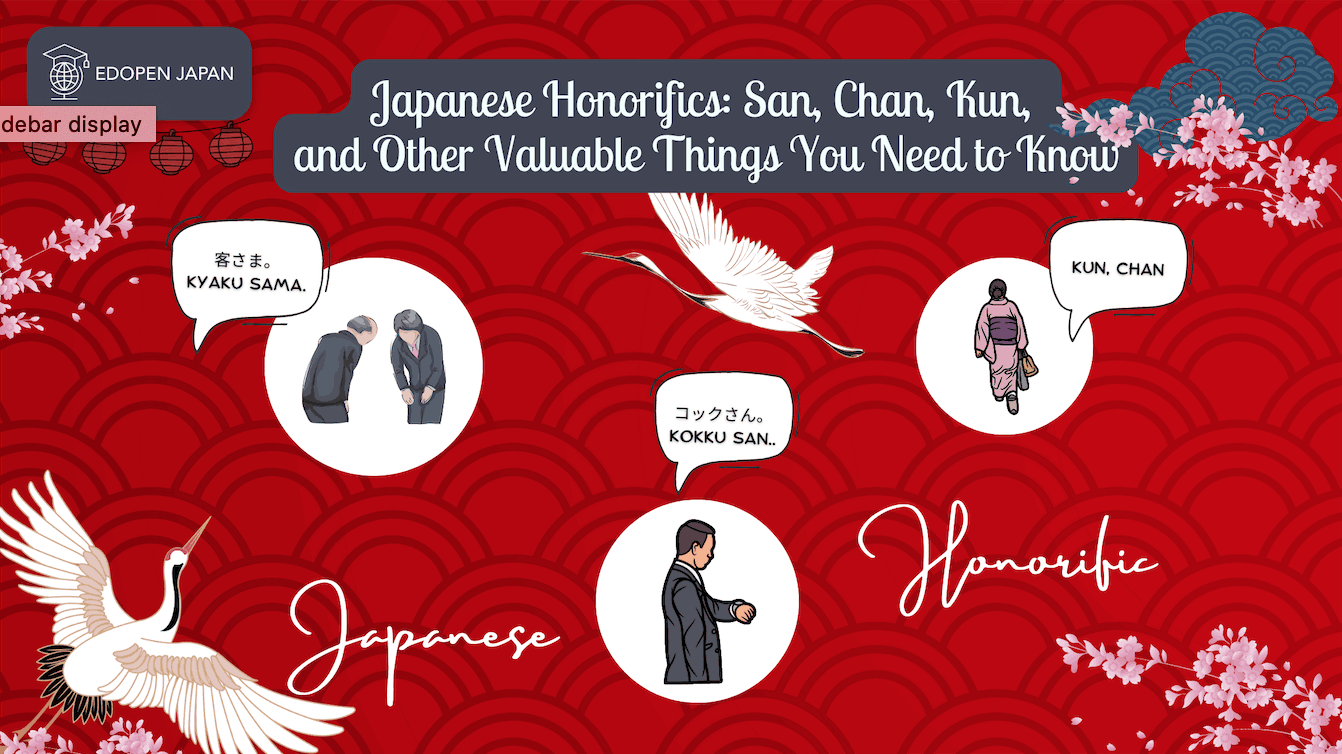Do you like watching Japanese anime or comics? If you study Japanese, you will come across suffixes used to address people called ‘honorifics’ such as ‘San’, ‘Chan’, and ‘Kun’. If you look at the subtitles while watching a Japanese film or comic, you may have noticed that-san translates as “Mr”, “Mrs” or “Ms”. This is a Japanese honorific and the most common one.
Japanese honorifics are an important way of conveying respect, formality, and friendship to those with whom you interact. Both formal and informal honorifics are common in Japanese, so every speaker needs to master the basic suffixes. Are there any other Japanese name endings? Actually, there are many ways to show respect in Japanese with honorifics!
In addition, you can check out our comprehensive look at some of the most commonly used and popular phrases in the Japanese language, below!
Read also:
15 Great Ways to Say Thank You in Japanese
How to Use “Yoroshiku Onegaishimasu”?
How are You in Japanese?
It’s really important to learn honorifics to master Japanese, so let’s get started.
Contents
Why are the Japanese “honorifics” so important?
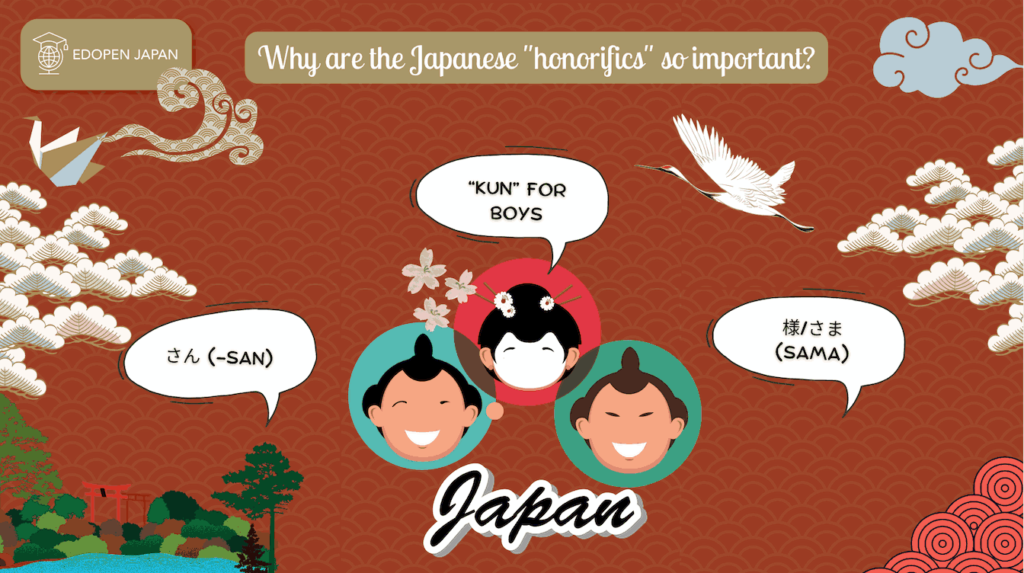
Every language represents the culture of the people who use it. That’s why Japanese salutations are so important. If there’s one thing you need to know about Japanese culture and language, it’s that everything is extra polite. Watch any Japanese film or show and you’ll see the many ways the Japanese show respect for each other. They bow, have set phrases to show appreciation, and add -さん (-san) to the end of names.
In English-speaking countries, we often call people by their first names, but in Japan, no matter how close you are, we rarely call the other person by their first name in business emails and business situations. Japanese people tend to respect the other person so often. Respect in Japanese is the easiest way for the speaker to show respect for the other person.
English Mr, Mrs, Miss and French M., Mme., Mlle. are placed before the name, but in Japanese, they are added later. Japanese honorifics are often derived from euphemisms that avoid direct expression and are often derived from Chinese words.
The most common formal title today is “Sama”, and in spoken language “San” is used for both men and women and “Kun” for boys. In addition, there are many titles such as “President”, “Manager”, and “Teacher” depending on gender, age, occupation, position, etc., but “san” is the most commonly spoken. Let’s see an example of the Japanese honorifics used to address other people!
The most important Japanese honorary titles (Formal Honorifics)
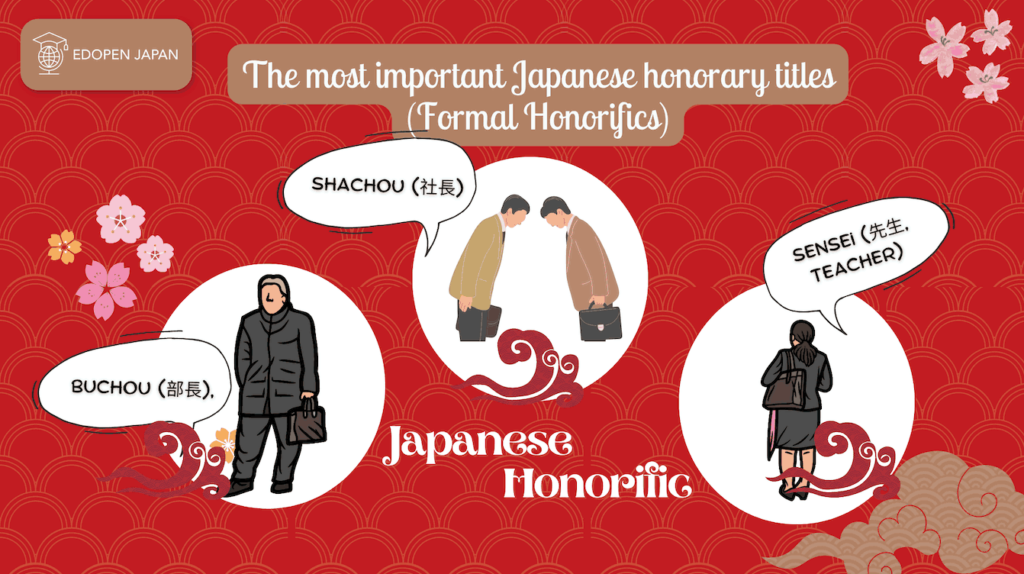
In this part, we’ll discuss the formal titles of honor: “San”, “Sama” and “Dono” with the following example.
1. さん (San)
The most common honorific is used both verbally and in conversation and is not uncomfortable to use in any situation. Give it to someone who is at a certain distance or who cannot measure your relationship with you for the first time. It is also a suffix for common kinship names. Such as follows:
“Oto-san: Father”
“Oka-san: Mother”
“Oni-san: Brother”
“One-san: Sister”
“Oji-san: Grandfather”
“Oba-san: Grandmother”, etc.
It is also common to use it after the job title or job title. “Shacho-san [president]”, “Tencho-san [store manager]”, ” Untenshu-san [driver]”, etc. It is also common to add it to the name of the shop. “Hukuya-san [Clothes shop]”, “Ramenya-san [Ramen shop]”, “Omochaya-san [Toy shop]”, etc.
In business settings, it is often used for the name of the other party’s organization, such as “Shoji-san [company name+San]”. The most common formal honorific is “San”, which translates (roughly) as Ms and Mr.
The Japanese suffix “san” is used among peers and in public settings such as offices or schools (unlike in the United States, co-workers and classmates usually refer to each other formally). It’s also used for acquaintances. When in doubt, you can always use “San”. It’s the safest way to address someone with respect without going overboard.
2. 様/さま (Sama)
The most formal honorific is “様 (sama)”. It is used to show respect for the other person. It is a title that is used in conversation as well as in writing and is not uncomfortable to use in any situation. It is mainly used in business situations, mail, and letters. It is the most respectful title in everyday use, so most Japanese use it in business situations in a company.
You can also use -sama to flatter people or to be sarcastic. For example, if you add the suffix to the male slang term for “I” (ore) to form ore-sama, it basically means “my royal self”. Although these formal Japanese honorifics are not often used in conversation (except for the sake of sarcasm), you will often hear them in movies, shows, and song lyrics.
3. 殿/どの (Dono)
In official texts, “Personal name + Dono” was widely used as a custom, but “Sama” is gradually being used. In modern times, it is not common to use “Dono” in conversation, and it is only used in documents. Also, while “sama” can be used freely in conversation and in documents, “dono” is restricted to documents. Even if the other person is a colleague or subordinate, using “Dono” in a conversation can give the impression of looking down on the other person.
“Sama” can be used in both spoken language and business documents. It can be used whether it is internal, current, or external. If you get lost in business emails or colloquialisms, you need to use “sama”.
On the other hand, the following titles are informal phrases. See the example below.
The Informal Honorary Titles
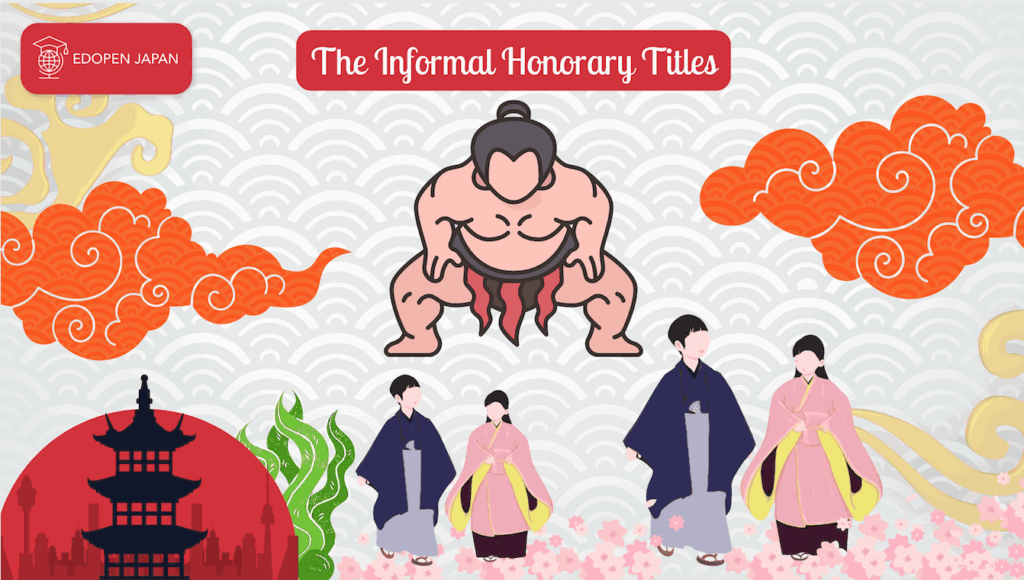
1. ちゃん (Chan)
It is often used affectionately for children, women, or pets younger than the speaker, but it is also a generic title sometimes used for peers and elders. It is often used for girls, but can also be used for boys. It can be used by close friends, whether adults or children and because it is closer than “San” it can be used for people who want to be close to each other.
It is also the suffix for common kinship names. “Oto-chan [father]” “Oka-chan [Mother] “Oni-chan [Brother]” “One-chan [Sister] “Oji-chan [Grandfather] “Oba-chan [Grandmother]”, etc. This is an endearing female honorific.
Although it’s most commonly used for children, it’s also quite common among family and friends. You can also use “Chan” for men; one of my second cousins, Dai, has always been Dai-chan instead of Dai-kun, probably because it just sounds better and more friendly. You can use “Chan” in the same way to add a sense of cuteness to names and titles.
2. くん (Kun)
The addition at the end of the name is the same as “San” and “Chan“. This is often used for men. This “kun” is the male equivalent of “Chan”, it’s used for children and between peers and friends. Then it can be used for familiar objects. When we want to get closer and build a better relationship, we always use “Chan” or “Kun” in conversation. This makes people feel more friendly and comfortable with each other.
Other Japanese Honorific Titles
There are many Japanese honorifics, but some of the most common are Buchou (部長), Kachou (課長), Shachou (社長) or Kaichou (会長), which refer to people of a certain rank in a company; and there are also honorifics, mostly used in a school context, such as Senpai (先輩, older person), Kouhai (後輩, younger person) or Sensei (先生, teacher).
[Job titles]
Daijin [大臣Minister], Kaicho [会長Chairman], Shacho [社長President], Sousai [総裁Governor], Honbucho [本部長Managing Director], Bucho [部長Director], Kacho [課長Manager], Kakaricho [係長Section Manager], Shunin [主任Section chief] etc.
[Representing qualifications and functions]
Sensei [先生Teacher],Bengoshi [弁護士Lawyers], Isha [医者Doctors], Kyoujyu [教授Professors], Kenchikushi [建築士Architects], Zeirishi [税理士Tax accountants], Untenshi [運転士Drivers], etc. Senshu [選手Player], is used by those engaged in sports. For your information, most of the articles and news related to the press, especially the game, are omitted and not used Honorifics.
How to use honorific titles in daily life?
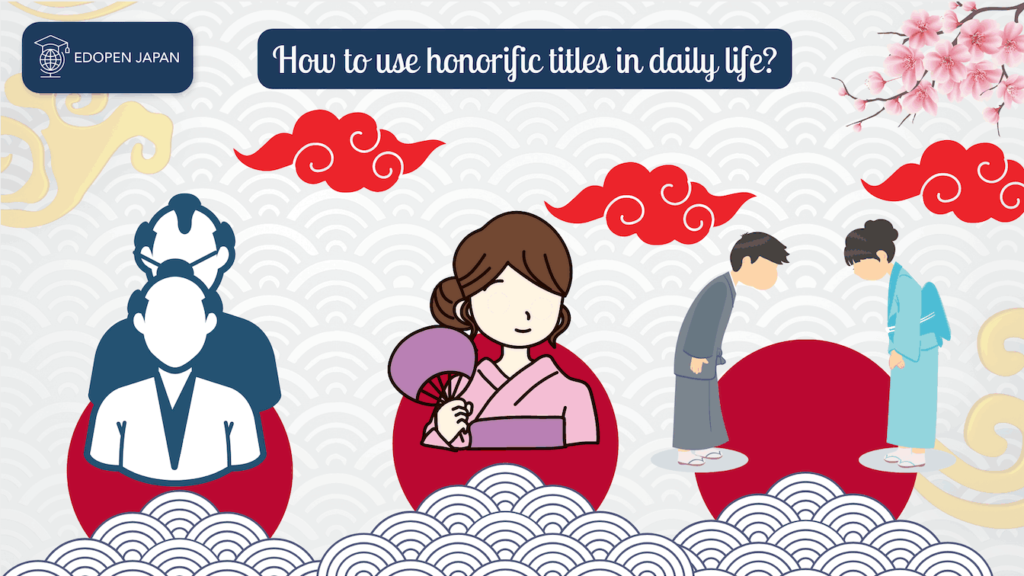
If you’re familiar with Japanese culture, you already know that people rarely use another person’s first name. Therefore, Japanese honorifics are tied to last names. It’s very rude to just call someone by their last name.
Sometimes the honorific is added to the person’s first name for other reasons, such as when two people are particularly close or if you’re a foreigner. Unlike Japanese, foreigners tend to use first names more often, and Japanese tend to respect this choice.
The word “honorific” is very important here. It is the key to understanding Japanese culture. “Honorifics are the symbol of respect for other people’s minds. By using honorifics, people can build good relationships and smooth communication in daily life.
Also, Japanese honorifics vary not only by person, but also by other factors such as the level of trust, the person’s background, education, or even gender. Even as a foreigner, it is important to respect these rules in order to feel welcome in this country. First, why don’t you use these “honorifics” to start learning Japanese?
Summary
To summarize, please review the following points:
- Respect is very important for building good relationships in everyday life in Japan.
- There are several honorifics in Japanese, and the most useful one is “San” in conversation.
- In a business situation, Japanese often use “様 (sama)” in documents.
- Better learn the above and some other Japanese honorifics if you go to Japan in the future.
What do you think about Japanese honorifics? Are they hard to understand? Or are they easy to understand? Please share your thoughts below.

